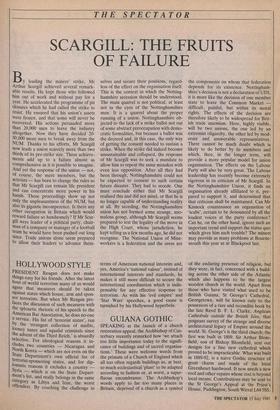THE SPECTATOR
SCARGILL: THE FRUITS OF FAILURE
By . leading the miners' strike, Mr Arthur Scargill achieved several remark- able results. He kept those who followed him out of work and without pay for a year. He accelerated the programme of pit closures which he had called the strike to resist. He ensured that his union's assets were frozen, and that some will never be recovered. His actions persuaded more than 20,000 men to leave the industry altogether. Now they have decided 20- 30,000 more men to break away from the NUM. Thanks to his efforts, Mr Scargill now leads a union scarcely more than two thirds of its pre-strike size. These achieve- ments add up to a failure almost as Comprehensive as it is possible to imagine. And yet the response of the union — not, of course, the mere members, but the activists — has been to change the rules so that Mr Scargill can remain life president and can concentrate more power in his hands. These proceedings show up not only the unpleasantness of the NUM, but also its gigantic incompetence. Is there any Other occupation in Britain which would reward failure so handsomely? If Mr Scar- gill were leader of a political party, chair- man of a company or manager of a football team he would have been pushed out long since. Trade unions alone seem prepared to allow their leaders to advance them- selves and secure their positions, regard- less of the effect on the organisation itself. This is the context in which the Notting- hamshire secession should be understood. The main quarrel is not political, at least not in the eyes of the Nottinghamshire men. It is a quarrel about the proper running of a union. Nottinghamshire ob- jected to the lack of a strike ballot not out of some abstract preoccupation with demo- cratic formalities, but because a ballot was the decreed and, in this case, the only way of getting the consent needed to sustain a strike. When the strike did indeed become unsustainable and collapsed, the response of Mr Scargill was to seek a mandate to allow him to repeat the same mistakes with even less opposition. After all they had been through, Nottinghamshire could not be expected to consent to such certain future disaster. They had to secede. One must conclude either that Mr Scargill realised this and did not mind, or that he is no longer capable of understanding reality at all. By seceding, the Nottinghamshire union has not formed some strange, ano- malous group, although Mr Scargill seems prepared to test the legality of the move in the High Court, whose jurisdiction, he kept telling us a few months ago, he did not recognise. The National Union of Mine- workers is a federation and the areas are the components on whom that federation depends for its existence. Nottingham- shire's decision is not a declaration of UDI, it is more like the decision of one member state to leave the Common Market — difficult, painful, but within its moral rights. The effects of the decision are therefore likely to be widespread for Brit- ish trade unionism. Here, highly visible, will be two unions, the one led by an extremist oligarchy, the other led by mod- erate and answerable representatives. There cannot be much doubt which is likely to do better by its members and which, then, in the longer term, will provide a more popular model for union organisation. The effects on the Labour Party will also be very great. The Labour leadership has recently become extremely vigorous in its criticism of Mr Scargill. In the Nottinghamshire Union, it finds an organisation already affiliated to it, pre- pared to support it, and determined that that criticism shall be maintained. Can Mr Kinnock countenance an organistion of 'scabs', certain to be denounced by all the loudest voices at the party conference? Can he, on the other hand, ignore such an important trend and support the status quo which gives him such trouble? The miners may provide as many problems at Bourne- mouth this year as at Blackpool last.










































 Previous page
Previous page